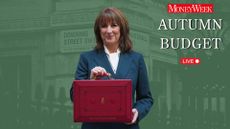Budget
The latest news, updates and opinions on Budget from the expert team here at MoneyWeek
-

'Expect more policy U-turns from Keir Starmer'
Opinion Keir Starmer’s government quickly changes its mind as soon as it runs into any opposition. It isn't hard to work out where the next U-turns will come from
By Matthew Lynn Published
Opinion -

High earners face £15k income hit by 2029 following Autumn Budget
Rachel Reeves’s Autumn Budget means high earners – or HENRYs – are now looking at an income hit running into the thousands. Can you avoid it?
By Dan McEvoy Published
-

Reeves's business rates hike will crush the British economy
Opinion By piling more and more stealth taxes onto businesses, the government is repeating exactly the same mistake of its first Budget, says Matthew Lynn
By Matthew Lynn Published
Opinion -

Petrol prices explained: What makes up the price of a litre of petrol?
Briefings The cost of filling the average car with fuel is falling. Here’s what makes up the price of a litre of petrol.
By Daniel Hilton Last updated
Briefings -

How to profit from the markets’ pessimism about Britain
Opinion There was little in the Budget to prop up Britain's stock market, but opportunities are hiding in plain sight. Investors should take advantage while they can
By Cris Sholto Heaton Published
Opinion -

Rachel Reeves's Autumn Budget: What it means for the UK
Opinion A directionless and floundering government has ducked the hard choices at the Autumn Budget, says Simon Wilson
By Simon Wilson Published
Opinion -

How the Budget will hurt you: MoneyWeek Talks
Podcast An Autumn budget podcast special episode, featuring MoneyWeek editors Kalpana Fitzpatrick, Andrew van Sickle and Cris Heaton.
By Kalpana Fitzpatrick Published
Podcast -

Why UK stocks are set to boom
Opinion Despite Labour, there is scope for UK stocks to make more gains in the years ahead, says Max King
By Max King Published
Opinion -

Autumn Budget live: Rachel Reeves cuts cash ISA limit
Live updates Chancellor Rachel Reeves unveiled a slew of tax hikes and ISA reforms in her second Autumn Budget. We take a look at the latest updates and analysis
By Jessica Sheldon Last updated
Live updates
